Si Mateneng of the Tao indigenous community felt like he had reunited with a lost friend. While visiting Seattle’s Burke Museum of Natural History and Culture, he encountered a boat that had been in the US since the 1970s, first hanging in a restaurant then languishing in a warehouse before being purchased by a collector and donated to the museum. Si Mateneng could tell from the crosses on the vessel, known as a tatala, that it was built on his homeland of Orchid Island (Lanyu, 蘭嶼) after the introduction of Christianity in 1959. He could hardly contain his excitement.
Si Mateneng was also excited to see a small tatala carving from around 1925, as it used processing methods that no longer exist.
“Despite being in the US, the experience left me feeling transported back to Lanyu, completely immersed in the richness of Tao culture. It was a unique and captivating sensation,” he says.
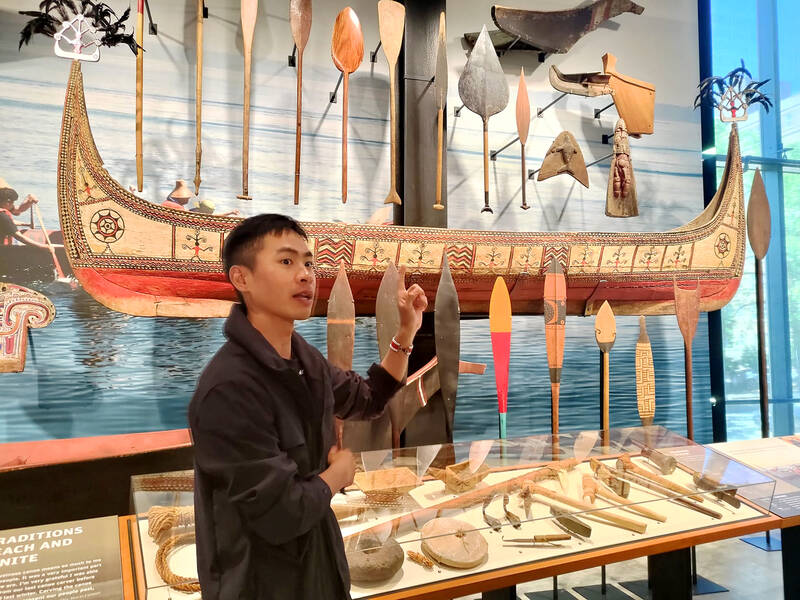
Photo courtesy of SI Mateneng
Si Mateneng was one of two Taiwanese youth ambassadors participating in the annual Tribal Canoe Journey that took place from late July to early August. The idea is for indigenous peoples from the region to journey from their lands and paddle toward a chosen location. This year more than 100 vessels eventually arriving in Aiki Beach in the US state of Washington, home of the Muckleshoot tribe.
Taiwanese participation was made possible by nonprofit organization Indigenous Bridges, which established a “canoe family” relationship with the Nisqually in 2017.
During the days-long journey through the Puget Sound, Si Mateneng had the opportunity to “pull” (paddle) a canoe twice for four hours each time.
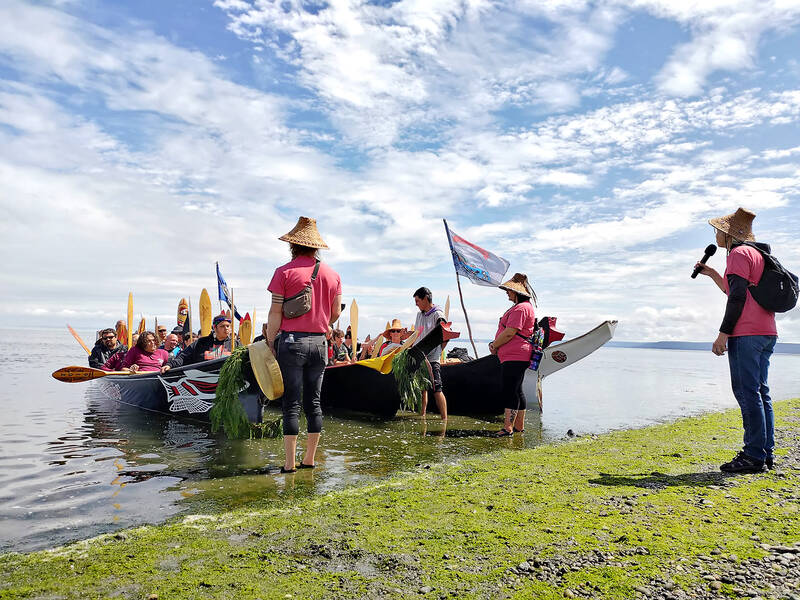
Photo courtesy of SI Mateneng
“It’s also an honor to pull, so everyone is fighting for the opportunity,” he says.
After the journey they spent time in Seattle, where Si Mateneng visited the tatala on display at the Burke Museum of Natural History and Culture and shared his knowledge with museum staff. That was the only event where they had to be somewhere at a set time.
“During the trip, we set out when the sun rose, landed whenever we arrived and meetings were held spontaneously,” he says.
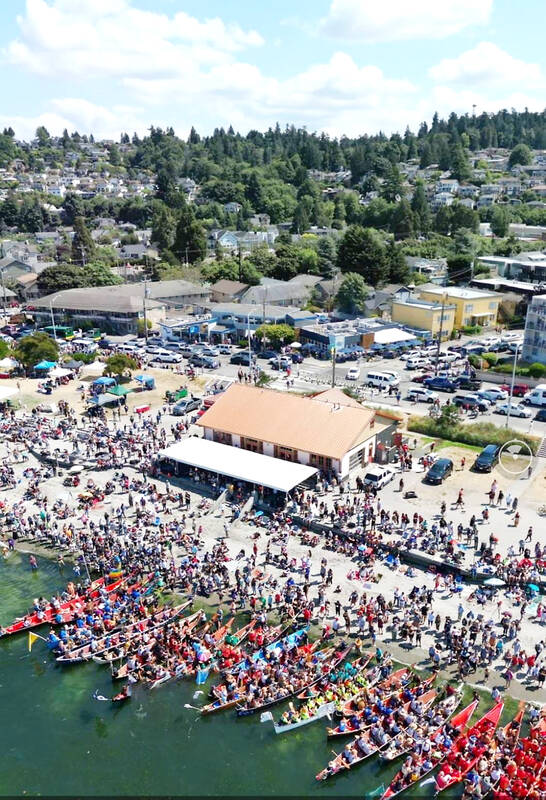
Photo courtesy of SI Mateneng
FIRST ROWING
Soon after arriving, Si Mateneng was eager to try his hand on one of the canoes to “test his relationship with the ocean.”
But he had to wait as many wanted to participate.
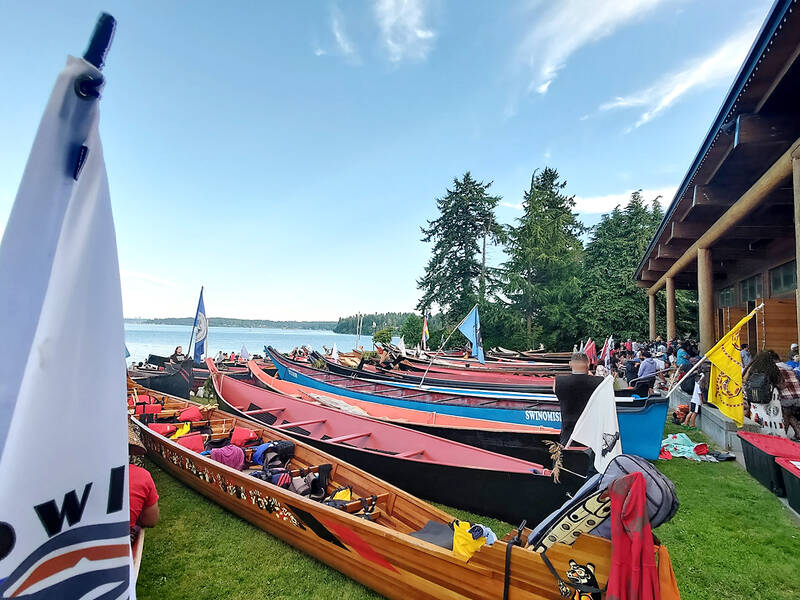
Photo courtesy of SI Mateneng
At the next stop, they were joined by the smaller Chehalis tribe, who looked like they could use some help. He ended up paddling for the entire four-hour journey, and was contemplating taking the following day off when a Nisqually paddler asked if he’d like to participate.
“Without a moment’s hesitation, I responded with a resounding ‘yes,’” Si Mateneng writes in his journal. Afterward, the Nisqually gifted him a “warrior” t-shirt, which he saw as an acknowledgement of his inclusion within the community.
“I felt that I was a nobody at first,” he says. “But after paddling, they started introducing my name, where I was from and that I also came from a [boat] culture. Only then could I share my traditions with them.”
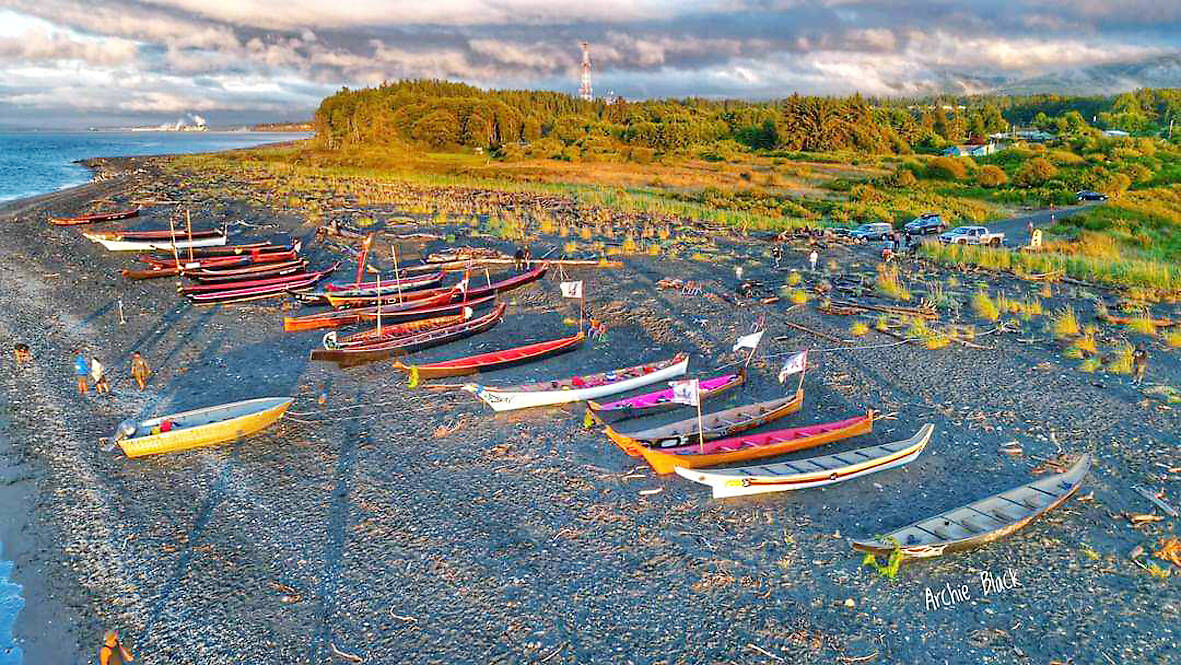
Photo courtesy of Gary Smoke
The communities perceive rowing the canoe as a healing, meditative process. Si Mateneng says that he had many worries before he arrived, and felt much calmer after.
“You have to focus on keeping up with the pace and making the correct motions; you don’t have any energy to think about other things,” he says. “You start really enjoying the moment.”
During the journey, the tribes explained some of their language and culture, and also kept participants motivated by dedicating each row to a cause.
“They’ll say, let’s pull 10 times for cancer patients, 10 times for those who lost family during COVID,” Si Mateneng says.
SHARED VALUES
About 20 canoes had congregated when Si Mateneng arrived, but their numbers grew along the way as more communities joined. Each stop had an indigenous host, and the paddlers followed traditional protocol by explaining who they were and asking permission to come ashore.
The host provided food for the guests, and Si Mateneng saw that they had much reverence toward the elders, who got to eat first, followed by the paddlers and then the rest of the participants.
Besides significant differences in structure and rowing style, he also noticed while the Tao still use their tatala in their daily livelihood, it’s become purely symbolic for the Native Americans.
“They place great importance on traditional practices, and that’s why they ride the canoes in the water once again,” he says. “They’re recreating what their ancestors once did, while respecting each other and their respective territories. This event really focuses on the humanistic aspect.”
Si Mateneng hopes that in Taiwan, he can also exchange and share with people more genuinely without worrying what each party gets out of it.
“It’s not just sharing what I have, but also my feelings and emotions on a more spiritual level,” he says.

On April 26, The Lancet published a letter from two doctors at Taichung-based China Medical University Hospital (CMUH) warning that “Taiwan’s Health Care System is on the Brink of Collapse.” The authors said that “Years of policy inaction and mismanagement of resources have led to the National Health Insurance system operating under unsustainable conditions.” The pushback was immediate. Errors in the paper were quickly identified and publicized, to discredit the authors (the hospital apologized). CNA reported that CMUH said the letter described Taiwan in 2021 as having 62 nurses per 10,000 people, when the correct number was 78 nurses per 10,000

As we live longer, our risk of cognitive impairment is increasing. How can we delay the onset of symptoms? Do we have to give up every indulgence or can small changes make a difference? We asked neurologists for tips on how to keep our brains healthy for life. TAKE CARE OF YOUR HEALTH “All of the sensible things that apply to bodily health apply to brain health,” says Suzanne O’Sullivan, a consultant in neurology at the National Hospital for Neurology and Neurosurgery in London, and the author of The Age of Diagnosis. “When you’re 20, you can get away with absolute

May 5 to May 11 What started out as friction between Taiwanese students at Taichung First High School and a Japanese head cook escalated dramatically over the first two weeks of May 1927. It began on April 30 when the cook’s wife knew that lotus starch used in that night’s dinner had rat feces in it, but failed to inform staff until the meal was already prepared. The students believed that her silence was intentional, and filed a complaint. The school’s Japanese administrators sided with the cook’s family, dismissing the students as troublemakers and clamping down on their freedoms — with

As Donald Trump’s executive order in March led to the shuttering of Voice of America (VOA) — the global broadcaster whose roots date back to the fight against Nazi propaganda — he quickly attracted support from figures not used to aligning themselves with any US administration. Trump had ordered the US Agency for Global Media, the federal agency that funds VOA and other groups promoting independent journalism overseas, to be “eliminated to the maximum extent consistent with applicable law.” The decision suddenly halted programming in 49 languages to more than 425 million people. In Moscow, Margarita Simonyan, the hardline editor-in-chief of the